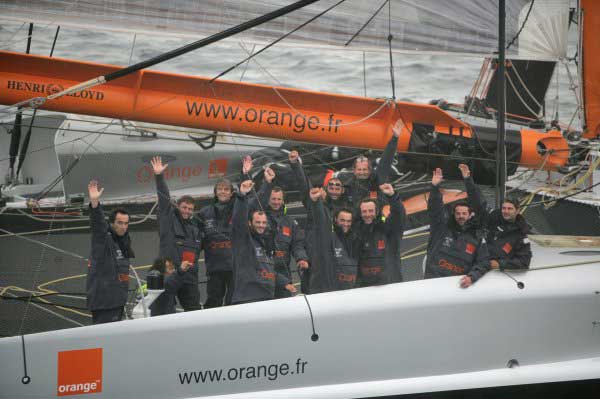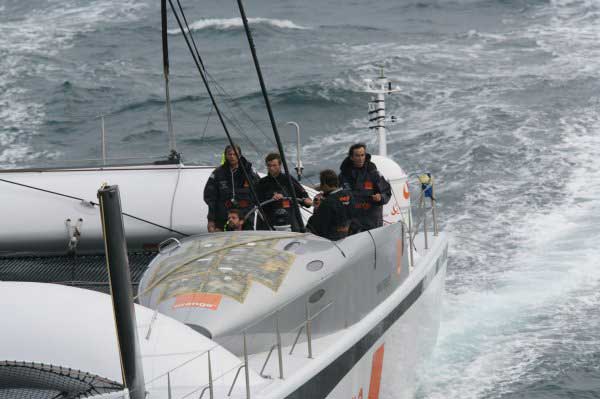Sailing News
Orange II Shatters the World 24-hour and
Trans-Atlantic Records
Bruno Peyron’s crew covered 752 miles on their first day!
 |
| Orange II breaking records. Photo: Gilles Martin-Raget |
No sailboat has ever been so fast until now. Having set out at 11h00’06 GMT on
Sunday from New York to attempt to snatch the incredible Atlantic record from
Chicagoan Steve Fossett (4 days, 17 hours 28 minutes and 6 seconds), Bruno
Peyron’s crew has already achieved something on this voyage. Orange II has just
demolished their own 24-hour sailing record by covering 752 miles in one day.
This is already something that will enter the history books and it may just be
the start. At a mind-blowing average speed of 31.3 knots, the maxi catamaran is
ahead of where PlayStation was on the charts. No sailboat has ever sailed more
quickly over 24 hours.
“It’s quite impressive, as we’ve once again found a greater potential in the
boat,” commented a quite calm Bruno Peyron. As the Orange II monster was
approaching the Newfoundland Banks, in precisely the weather conditions that you
can expect in this desolate region of the North Atlantic: thick mist and crossed
seas. “It’s a real pea-souper. We can’t make out the bows of the boat and we’re
on permanent radar alert to avoid any fishing boats that may lie in our path.”
Under the small gennaker and two reefs in the mainsail, Orange II is diving into
the fog attacking the tough record set by Steve Fossett’s PlayStation. This time
considered to be unbeatable by many was set in October 2001 by the American
billionaire: 4 days, 17 hours, 28 minutes and 6 seconds.
Orange II crossed the finish line at The Lizard this evening at 19h24 GMT.
Setting out from New York on Sunday, Bruno Peyron and his maxi catamaran with
eleven crewmen crossed the North Atlantic in 4 days, 8 hours, 23 minutes and 54
seconds at an average speed above 27 knots via the theoretical route. The Orange
II Dream Team improved on the record set by Steve Fossett’s PlayStation by 9
hours 4 minutes and 12 seconds, a record that was said to be unbeatable. Here
are some of Bruno Peyron’s first reactions a few seconds after he crossed the
finish:
Your first feeling?
“It’s immense joy...There are smiles on all the tired faces. It’s only normal as
we have given it our all and sometimes in life doing your utmost is a good
thing. We’re focused on what is happening at the moment. For me, that makes
three Jules Verne Trophies and three Atlantic records. What I like too is the
way it happened. Things went exactly as planned. The whole crew reacted just
right and at the right moment. We hit a bit of ice. I think at least that that
was what it was. But we reacted correctly. The boat is “wounded” but in one
piece and safe, so we can be proud of our work. It all feels a bit strange. It’s
as if we only set out from New York yesterday.”
 |
| The team on Orange II. Photo: Gilles Martin-Raget |
Was it a very exhausting record?
“It’s a physical record that requires commitment. There weren’t many of us here.
We chose to go with a total of twelve in two watches, so automatically that
takes a lot of effort. But it’s a pleasant tiredness. On the circumnavigation,
it’s rather different, as you have to manage things over a longer period. This
time we were in the plane on the eve of setting sail and jet lag or not, we set
sail immediately. Moreover we hoped we wouldn’t have too many manoeuvres to do,
but we ended up doing twenty or so. We did them with the whole crew out on deck,
even at 35 knots in the middle of the night in the mist, of course. When the
watch on rest is woken up twice, it is certainly tiring.”
The damage to the rudder?
“We lost between 6 and 8 hours with this incident with the rudder, but really
it’s not that serious, even if we know we could do better and the boat deserved
better. But I’ll say it again, it doesn’t really matter. It gives our friends
and enemies a bit of a chance to try and beat us… and it will give us another
chance to come back and try again, even if it wasn’t deliberate.”
Is it possible to cut the time to below 4 days?
“Without hesitation, yes. When we did our route planning before the collision
with the UFO, this bit of ice, we were in the process of setting a time of less
than four days. So, I’ll say it again: without hesitation, yes. Crossing in less
than four days is possible.”
 |
| Arriving at The Lizard. Photo: Gilles Martin-Raget |
There’s competition arriving with some new maxis…
“Competition? They have a margin of around ten hours. We could have done it in
that time, but I think we have left them around ten hours. I’m pleased the
rivals are signing up, as if we are still number one in this sport, we’re going
to have to fight to remain at the top. The new crews are very fine teams, very
efficient…”
History of the North Atlantic record
The first record on this route was set by Charlie Barr, the captain of the
Atlantic schooner. The proud vessel managed to complete the crossing in 1905 in
12 days and 4 hours, a time that was to remain the record for 75 years. In 1980,
Eric Tabarly and his foiler Paul Ricard improved on Barr’s performance by two
days, crossing the Atlantic at an average speed of 11.93 knots. Following that,
the attempts and improvements came at a steady pace. The record would gradually
be improved upon by the French expert multihull racers: Marc Pajot, Patrick
Morvan, Loïc Caradec, Philippe Poupon and finally Serge Madec... On board Jet
Services V (the future Commodore Explorer), he was to set a record (6 days, 13
hours and 3 minutes) in 1990 that was to last 11 years. We had to wait for the
right moment and Steve Fossett’s attempt to see the record fall: on 10th October
2001, PlayStation set the historic record of 4 days, 17 hours, 28 minutes and 6
seconds. Since then, only Bruno Peyron has made an attempt at the record. Holder
of the single-handed Atlantic record on two occasions, the skipper of Orange II
has not yet managed to improve on this crewed record. We should add that on his
last attempt back in August 2004, he missed out on the record by a whisker (just
31 minutes).
Reminder: the North Atlantic crewed record
- Route: New York / The Lizard (south western tip of Great Britain)
– Current record: Steve Fossett / giant catamaran PlayStation / 10th October
2001
– Record time to beat: 4 days, 17 hours, 28 minutes and 06 seconds
– Average speed during the crossing: 25.78 knots
www.orange-sailing-team.com